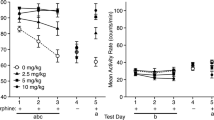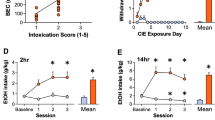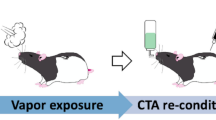Abstract
Two experiments were conducted to test the hypothesis that tolerance to the hypothermic effect of ethanol fails to develop if rats are denied the unconditional stimulus represented by hypothermia. In both experiments, rats were injected with either ethanol (1.9 or 2.5 g/kg) or saline and given microwave hyperthermia (MHT) to offset the hypothermic effect of the drug or sham-MHT. In one experiment, rats no longer demonstrated a hyperthermic response to a saline challenge after hypothermia was offset during 5 MHT treatment sessions. In a second experiment, rats prevented from becoming hypothermic did not develop tolerance to the hypothermic effect of ethanol due to MHT treatment, but did become tolerant to the ataxic effects of ethanol, which were unaffected by MHT. Results suggest that rats must experience the specific consequences of a drug to become tolerant to that effect.
Similar content being viewed by others
References
Adair ER, Adams BW (1980) Microwaves modify thermoregulatory behavior in squirrel monkey. Bioelectromagnetics 1:1–20
Alkana RL, Finn BS, Malcom RD (1982) The importance of experience in the development of tolerance to ethanol hypothermia. Alcoholism: Clin Exp Res 6:134
Alkana RL, Finn BS, Malcom RD (1983) The importance of experience in the development of tolerance to ethanol hypothermia. Life Sci 32:2685–2692
Barry III H (1983) Adaptive behavior of alcohol tolerance and withdrawal. In: Cicero TJ (ed) Ethanol tolerance and dependence: Endocrinological aspects. Research Monograph No 13, NIAAA. DHHS Publication No (ADM) 83–1258, Washington, DC, USGPO, pp 16–26
Briese E, de Quijada MG (1970) Colonic temperature of rats during handling. Acta Physiol Latiaom 20:97–102
Carroll DR, Levinson DM, Justesen DR, Clarke RE (1980) Failure of rats to escape from a potentially lethal microwave field. Bioelectromagnetics 1:101–106
Chen CS (1979) Acquisition of behavioral tolerance to ethanol as a function of reinforced practice in rats. Psychopharmacology 63:285–288
Crabbe JC, Rigter H, Jijlen J, Strijbos C (1979) Rapid development of tolerance to the hypothermic effect of ethanol in mice. J Pharmacol Exp Ther 208:128–133
Crowell CR, Hinson RE, Siegel S (1981) The role of conditional drug response in tolerance to the hypothermic effects of ethanol. Psychopharmacology 73:51–54
Durney CH, Johnson CC, Barber PW, Massoudi H, Iskander MF, Lords JL, Ryser DK, Allen SJ, Mitchell JC (1978) Radiofrequency Dosimetry Handbook (Second Edition). USAF School of Aerospace Medicine, AFSC, Brooks AFB, Texas
Eikelboom R, Stewart J (1982) Conditioning of drug-induced physiological responses. Psychol Rec 89:507–528
Georgiev J (1978) Influences of environmental conditions and handling on the temperature rhythm of the rat. Biotel Patient Monit 5:229–234
Gibbins RJ, Kalant H, LeBlanc AE (1968) A technique for accurate measurement of moderate degrees of alcohol intoxication in small animals. J Pharmacol Exp Ther 159:236–242
Goldstein A, Aronow L, Kalman SM (1974) Drug tolerance and physical dependence. In: Principles of drug action: The basis of pharmacology, Second Edition. John Wiley and Sons, New York, pp 569–621
Guy AW, Wallace J, McDougall (1979) Circularly polarized 2450-MHz waveguide system for chronic exposure of small animals to microwaves. Radio Science 14:63–74
Hjeresen DL, Doctor SR, Sheldon RL (1979) Shuttlebox side preference during pulsed microwave and conventional auditory cues. In: Proceedings of symposium on electromagnetic fields in biological systems. International Microwave Power Institute, Edmonton, Alberta, Canada, pp 194–214
Hjeresen DL, Loebel AC, Woods SC (1982) Cross-tolerance between cold-induced and ethanol-induced hypothermia. Alcoholism: Clin Exp Res 6:145
Jaffe JH (1980) Drug addiction and drug abuse. In: Gilman AG, Goodman LS, Gilman A (eds). The pharmacological basis of therapeutics. New York: MacMillan, pp 535–584
Johnson DA, Friedman HJ, Cooke R, Lee NM (1980) Adaptation of brain lipid bilayers to ethanol-induced fluidization. Species and strain generality. Biochem Pharmacol 29:1673–1676
Khanna JM, Le AD, Kalant H, LeBlanc AE (1979) Cross-tolerance between ethanol and morphine with respect to their hypothermic effects. Eur J Pharmacol 59:145–149
Le Ad, Poulous CX, Cappelli H (1979) Conditioned tolerance to the hypothermic effect of ethyl alcohol. Science 206:1109–1110
LeBlanc AE, Gibbins RJ, Kalant H (1973) Behavioral augmentation of tolerance to ethanol in the rat. Psychopharmacologia 30:117–122
LeBlanc AE, Gibbins RJ, Kalant H (1975a) Generalization of behaviorally augmented tolerance to ethanol, and its relation to physical dependence. Psychopharmacologia 44:241–246
LeBlanc AE, Kalant H, Gibbins RJ (1975b) Acute tolerance to ethanol in the rat. Psychopharmalogia 41:43–46
LeBlanc AE, Kalant H, Gibbins RJ (1976) Acquisition and loss of behaviorally augmented tolerance to ethanol in the rat. Psychopharmacology 48:153–158
Lomax P, Lee RJ (1982) Cold acclimation and resistance to ethanol-induced hypothermia. Eur J Pharmacol 84:87–91
MacIntosh NJ (1974) The psychology of animal learning, New York: Academic Press, pp 78–81
Mansfield JG, Cunningham CL (1980) Acquisition and loss of behaviorally augmented tolerance to ethanol in the rat. Psychopharmacology 48:153–158
Mansfield JG, Benedict RS, Woods SC (1983) Response specificity of behaviorally augmented tolerance to ethanol supports a learning interpretation. Psychopharmacology: 79:94–98
Melchior CL, Tabakoff B (1981) Modification of environmentally cued tolerance to ethanol in mice. J Pharmacol Exp Ther 219:175–180
Siegel S (1975) Evidence from rats that morphine tolerance is a learned response. J Comp Physiol Psychol 89:498–506
Siegel S (1977) Morphine tolerance acquisition as an associative process. J Exp Psychol (Anim Behav) 3:1–13
Siegel S (1978) Tolerance to the hypothermic effect of morphine in the rat is a learned response. J Comp Physiol Psychol 92:1137–1149
Siegel S, MacRae J (1984) Environmental specificity of tolerance. Trends Neurosci May 1984: 140–143
Tiffany ST, Petrie EC, Baker TM, Dahl JL (1983) Conditioned morphine tolerance in the rat: absence of a compensatory response and cross-tolerance with stress. Behav Neurosci 97:335–353
Wallgren H, Barry III H (1970) Actions of alcohol. Elsevier, Amsterdam, London, New York
Wenger JR, Tiffany TM, Woods SC (1980) Comparison of learned and unlearned factors in the acquisition of behavioral tolerance to ethanol and sedative-hypnotic drugs. In: Eriksson K, Sinclair JD, Kiianmaa K, Pawlawski AA (eds) Animal models in alcohol research. Academic Press, New York
Wenger JR (1980) Learned factors in ethanol tolerance. Doctoral Dissertation, University of Washington
Wenger JR, Tiffany TM, Bombardier C, Nicholls K, Woods SC (1981) Ethanol tolerance in the rat is learned. Science 213:575–577
Author information
Authors and Affiliations
Rights and permissions
About this article
Cite this article
Hjeresen, D.L., Reed, D.R. & Woods, S.C. Tolerance to hypothermia induced by ethanol depends on specific drug effects. Psychopharmacology 89, 45–51 (1986). https://doi.org/10.1007/BF00175187
Received:
Revised:
Issue Date:
DOI: https://doi.org/10.1007/BF00175187




